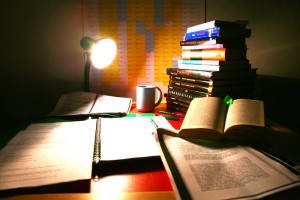
What was originally meant to be a humorous remark by one ECLA instructor during the Academic Orientation Session—the first real encounter with members of the faculty—soon became a creed to the students.
Too tempting were the sign-up sheets for Berlin Weekend, and too interesting were all the many new people around, to leave time for a fundamental need: sleep.
Time management received a completely new dimension as people tried to adjust their sleeping patterns to include all those little things they had to do and wanted to do during their first week in Berlin: discovering the surrounding neighbourhood of Pankow, picking up a truckload of books for seminar courses, rethinking the whole concept of education after working through Ortega y Gasset’s essay “Mission of the University”—the first required reading for the year, moving around couches and tables in the common room of the dormitory and, finally, buying a BVG Monatskarte. Getting the monthly transport tickets turned out to be a bureaucratic ordeal, but once acquired, they were immediately put to use.
The days didn’t officially end after dinner at 19:30, but rather, they would often stretch into the late hours of the evening because there were so many ideas to be discussed. Rumours have it that this week, Orientation Week, sparked a craving for coffee even in some of the most resolute objectors of that bitter, terrifying and ambrosian drink. Any room for afternoon naps? Unthinkable. And the events for Berlin Weekend hadn’t even started yet.
Berlin Weekend was considered the warmest and most beautiful week of the “summer” by native Berliners. The lucky ones, who had already acquired that small but mightyMonatskarte, used it to go back and forth between Pankow and the inner-city as often as they could.
Power napping on the way? A totally new and exciting opportunity. The 40 minute ride on the M1, going directly to the city centre, proved to perfectly suit this purpose. And as one of the students put it, “The problem is not finding something to do in Berlin, but choosing what to do.”
Enthusiastic newcomers signed up for every event they could possibly take part in; even for the ones taking place simultaneously (we must have some time travellers amongst us!), and frequently would be seen hurrying from meeting point to meeting point.
Groups of ECLA students could be found exploring the many facets Berlin has to offer: wandering through the national galleries, occasionally pausing to get Falafel, taking group pictures on the lap of a giant bronze sculpture of Karl Marx, and enjoying delicious ice cream. If it were possible, I’m sure everyone would have equipped themselves with a coffee-drinking helmet for the Berlin Weekend bike tour as well.
Interestingly enough, there was one event amongst all the options that seemed to directly speak to the ECLA students’ restlessness: Nachtmusik at the Radialsystem V, an old pumping station that is now an arts and culture space.
In an alternative approach to eighteenth-century music, a cellist and a viola da gamba player whisked us away to a liminal place—somewhere between sleeping and waking, while we curled up on yoga mattresses in a dark and cosy room. Some of us may have crossed that thin line, but to date it could not be proven.
by Johanna Fürst (AY’12, Austria)
